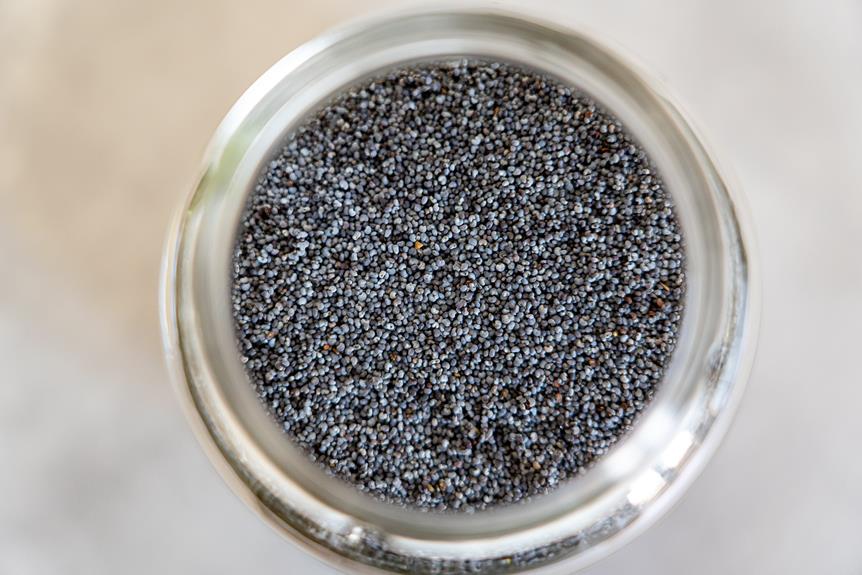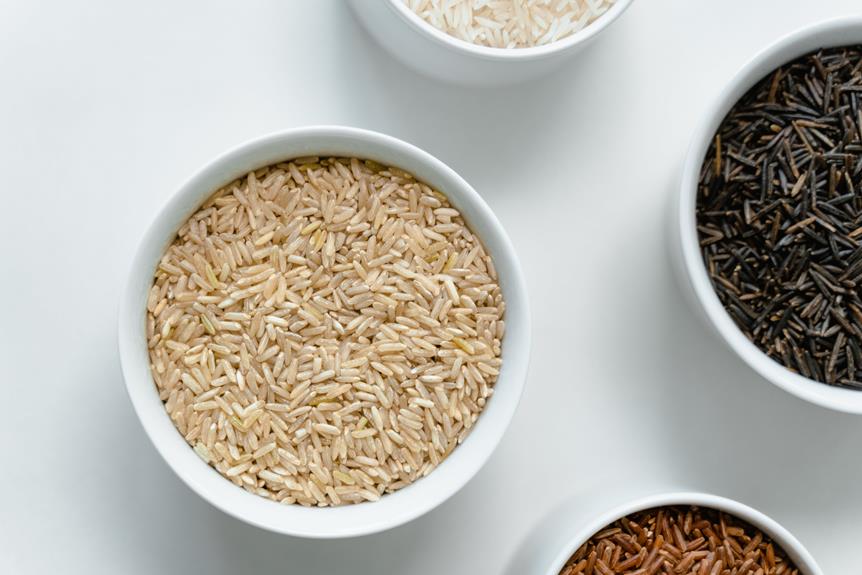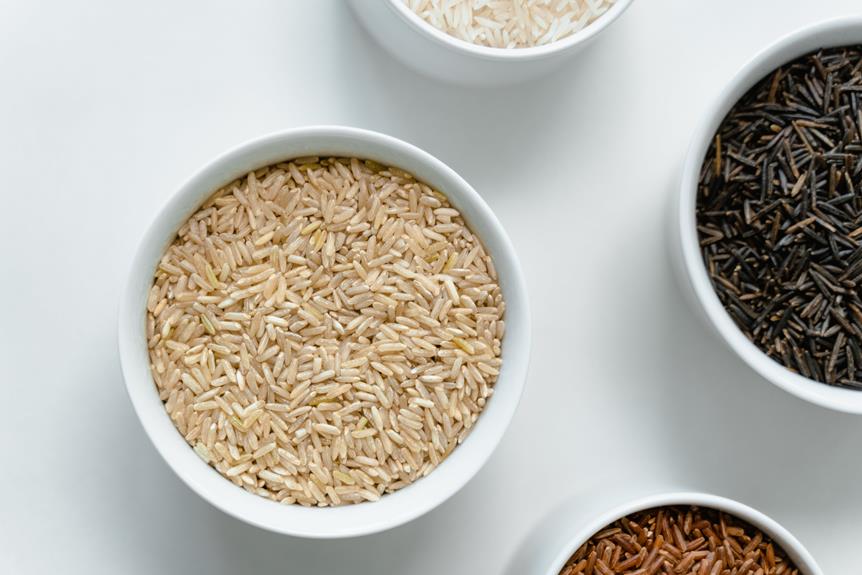Did you know that what you eat can have a significant impact on the health of your gut bacteria? It's true! The dietary fiber you consume plays a crucial role in maintaining a healthy balance of gut microbiota. But how exactly does fiber affect your gut and why is it so important? In this discussion, we will explore the seven tips that can help you optimize your fiber intake and improve your gut health. So, let's dive in and uncover the fascinating relationship between dietary fiber and gut bacteria!
Key Takeaways
- Dietary fiber promotes a healthy gut by supporting beneficial bacteria growth and aiding in SCFAs production.
- Fiber-rich foods regulate bowel movements, prevent constipation, and aid in weight management.
- Fiber serves as food for beneficial bacteria, enhancing digestion, immunity, and stool bulk.
- Fiber's role in digestion includes promoting regular bowel movements, enhancing nutrient absorption, and controlling blood sugar levels.
Importance of Dietary Fiber
Dietary fiber plays a crucial role in promoting a healthy gut by supporting the growth and diversity of beneficial bacteria. When you consume foods rich in fiber, such as fruits, vegetables, whole grains, and legumes, you provide nourishment to the trillions of microorganisms residing in your gut.
These beneficial bacteria, also known as gut microbiota, thrive on fiber. They ferment the fiber that passes through the digestive system, producing short-chain fatty acids (SCFAs) as a byproduct. SCFAs, such as butyrate, acetate, and propionate, are essential for maintaining the health of the gut lining and regulating inflammation.
By consuming a diet high in fiber, you create an environment in your gut that is conducive to the growth of these beneficial bacteria. The more diverse your gut microbiota, the better it is for your overall health. Fiber acts as a prebiotic, providing nourishment specifically for the good bacteria, allowing them to flourish and outcompete harmful bacteria.
Furthermore, fiber helps to regulate bowel movements and prevent constipation. It adds bulk to the stool, making it easier to pass through the intestines. This not only promotes regularity but also helps to prevent the buildup of harmful substances in the colon, reducing the risk of conditions such as colorectal cancer.
In addition to its impact on gut health, dietary fiber can also aid in weight management. Foods high in fiber tend to be more filling and can help control appetite, leading to a reduced caloric intake. This, combined with the gut-regulating effects of fiber, can contribute to maintaining a healthy weight.
Fiber and Gut Microbiota
Now let's talk about the role of fiber in your gut microbiota and the health benefits it brings. Fiber acts as a source of food for the beneficial bacteria in your gut, helping them thrive and maintain a balanced ecosystem. This, in turn, supports proper digestion, nutrient absorption, and a strong immune system.
Fiber's Role in Microbiota
Understanding the role of fiber in the gut microbiota is crucial for comprehending its impact on overall health and digestion. Fiber acts as a source of nourishment for the diverse community of microorganisms residing in your gut. Here are four ways fiber interacts with your gut microbiota:
- Fiber provides a substrate for fermentation, allowing beneficial bacteria to thrive and produce essential compounds such as short-chain fatty acids.
- It promotes the growth of probiotic bacteria, which can help maintain a balanced gut microbiota.
- Fiber increases stool bulk and improves transit time, aiding in regular bowel movements and preventing constipation.
- Certain types of fiber, such as prebiotics, selectively stimulate the growth of specific beneficial bacteria, contributing to a more diverse and resilient gut microbiota.
Gut Health Benefits
To experience the benefits of a healthy gut, incorporating fiber into your diet is essential. Fiber plays a crucial role in maintaining gut health by nourishing the beneficial bacteria in your gut microbiota. When you consume fiber-rich foods, such as fruits, vegetables, whole grains, and legumes, these fibers act as prebiotics, which serve as food for the good bacteria in your gut. The bacteria then ferment the fiber, producing short-chain fatty acids (SCFAs) that provide numerous benefits to your gut and overall health. SCFAs help to regulate bowel movements, reduce inflammation, strengthen the gut barrier, and enhance the absorption of essential nutrients. By promoting a diverse and balanced gut microbiota, fiber contributes to improved digestion, immune function, and even mental health. So, make sure to include fiber in your daily diet for optimal gut health.
Fiber's Role in Digestion
Consuming dietary fiber plays a crucial role in the digestion process. Fiber is a key component that helps your body break down and absorb nutrients efficiently. Here are four ways in which fiber supports digestion:
- Promotes regularity: Fiber adds bulk to your stool, making it easier to pass through your digestive system. This helps prevent constipation and promotes regular bowel movements.
- Enhances nutrient absorption: Fiber acts like a sponge, absorbing water and forming a gel-like substance in your digestive tract. This slows down the digestion of carbohydrates, allowing for better absorption of nutrients like glucose.
- Supports gut health: Fiber acts as a prebiotic, providing nourishment for the beneficial bacteria in your gut. These bacteria help break down fiber into short-chain fatty acids, which have been linked to improved gut health and reduced risk of digestive disorders.
- Controls blood sugar levels: Soluble fiber, found in foods like oats and legumes, can help regulate blood sugar levels. It slows down the absorption of glucose, preventing spikes and crashes in blood sugar levels.
Types of Dietary Fiber
There are several types of dietary fiber that provide various health benefits. These types can be classified into two main categories: soluble fiber and insoluble fiber. Soluble fiber dissolves in water and forms a gel-like substance in the digestive tract. It can be found in foods such as oats, barley, legumes, and fruits. Soluble fiber is known for its ability to lower cholesterol levels, regulate blood sugar levels, and promote a healthy gut environment.
Insoluble fiber, on the other hand, does not dissolve in water and adds bulk to the stool. This type of fiber can be found in foods like whole grains, nuts, seeds, and vegetables. Insoluble fiber helps prevent constipation, promotes regular bowel movements, and aids in maintaining a healthy weight. It also provides a feeling of fullness, which can be beneficial for weight management.
In addition to soluble and insoluble fiber, there is also a type of fiber called resistant starch. Resistant starch is a type of carbohydrate that resists digestion in the small intestine and instead reaches the large intestine intact. It acts as a prebiotic, providing fuel for the beneficial bacteria in the gut and promoting their growth. Resistant starch can be found in foods like green bananas, cooked and cooled potatoes, and legumes.
It is important to incorporate a variety of dietary fiber sources into your diet to reap the maximum health benefits. Aim to include a balance of soluble and insoluble fiber-rich foods in your meals. By doing so, you can support a healthy gut environment, regulate digestion, and improve overall wellness.
Fiber's Impact on Gut Health
Now let's talk about how fiber affects your gut health. The presence of fiber in your diet plays a crucial role in maintaining a healthy balance of gut bacteria. This, in turn, promotes good digestive health and can alleviate issues like constipation and bloating. Additionally, the benefits of dietary fiber extend beyond gut health, as it can also help regulate blood sugar levels and reduce the risk of certain chronic diseases.
Gut Bacteria and Fiber
Eating a high-fiber diet positively influences the composition of your gut bacteria. By incorporating more fiber into your meals, you can create a thriving environment for beneficial bacteria in your gut. Here are four ways in which fiber impacts your gut bacteria:
- Increased diversity: Fiber provides nourishment for a wide range of bacteria species, promoting a diverse gut microbiome.
- Production of short-chain fatty acids: Gut bacteria ferment fiber to produce short-chain fatty acids, which play a crucial role in maintaining gut health.
- Improved gut barrier function: Fiber helps strengthen the gut barrier, preventing harmful substances from entering the bloodstream.
- Reduced inflammation: Fiber-rich foods have anti-inflammatory properties, which can help alleviate inflammation in the gut.
Fiber and Digestive Health
Incorporating fiber into your diet has a significant impact on your digestive health, particularly in relation to the well-being of your gut. Fiber plays a crucial role in promoting regular bowel movements and preventing constipation. It adds bulk to your stool, making it easier to pass through the digestive tract. By doing so, fiber helps to prevent the build-up of waste and toxins in your gut, reducing the risk of digestive disorders such as bloating and gas. Additionally, fiber acts as a prebiotic, providing nourishment for the beneficial bacteria in your gut. These bacteria help to break down fiber into short-chain fatty acids, which provide energy for the cells lining your intestines and contribute to a healthy gut environment. So, by including fiber-rich foods like fruits, vegetables, whole grains, and legumes in your diet, you can support the overall health of your digestive system.
Benefits of Dietary Fiber
By including fiber-rich foods in your diet, you can positively impact the health of your gut by promoting regular bowel movements and nourishing beneficial bacteria. Here are some benefits of dietary fiber:
- Improved digestion: Fiber helps to add bulk to your stool, making it easier to pass through your intestines and promoting regular bowel movements. This can help prevent constipation and keep your digestive system functioning properly.
- Reduced risk of colon cancer: High-fiber diets have been associated with a decreased risk of colon cancer. Fiber helps to keep your colon healthy by providing nourishment to the beneficial bacteria in your gut, which produce short-chain fatty acids that have protective effects against cancer.
- Weight management: Fiber-rich foods are often low in calories and can help you feel fuller for longer. By including more fiber in your diet, you may be able to manage your weight more effectively.
- Lower cholesterol levels: Soluble fiber, found in foods like oats, beans, and fruits, can help lower cholesterol levels by binding to cholesterol in the digestive tract and preventing its absorption into the bloodstream.
Including fiber in your diet can have numerous benefits for your gut health, so be sure to incorporate plenty of fiber-rich foods into your meals and snacks.
Recommended Daily Fiber Intake
To maintain a healthy digestive system, it is important to ensure that you include an adequate amount of dietary fiber in your daily diet. The recommended daily fiber intake varies depending on factors such as age, sex, and overall health. However, a general guideline for adults is to consume between 25 to 38 grams of fiber per day.
Increasing your fiber intake can have numerous benefits for your digestive health. Fiber helps to promote regular bowel movements, prevent constipation, and maintain healthy gut bacteria. It also helps to regulate blood sugar levels, lower cholesterol levels, and promote satiety, which can aid in weight management.
There are two types of dietary fiber: soluble and insoluble. Soluble fiber dissolves in water and forms a gel-like substance, which helps to slow down digestion and promote feelings of fullness. Good sources of soluble fiber include oats, barley, legumes, and fruits such as apples and oranges. Insoluble fiber, on the other hand, adds bulk to the stool and helps to prevent constipation. Whole grains, vegetables, and nuts are excellent sources of insoluble fiber.
To meet your daily fiber needs, it is important to include a variety of high-fiber foods in your diet. Start by incorporating whole grains such as brown rice, quinoa, and whole wheat bread. Include a variety of fruits and vegetables, aiming for at least five servings per day. Legumes such as beans, lentils, and chickpeas are also great sources of fiber. Additionally, snacking on nuts and seeds can help to increase your fiber intake.
Remember to increase your fiber intake gradually and drink plenty of water throughout the day. This will help to prevent any potential digestive discomfort that may arise from suddenly increasing your fiber consumption. By meeting your recommended daily fiber intake, you can support a healthy digestive system and overall well-being.
Tips to Increase Fiber Consumption
Increase your fiber consumption with these simple tips. Adding more fiber to your diet can have numerous benefits for your gut health and overall well-being. Here are some easy ways to increase your fiber intake:
- Choose whole grains: Opt for whole grain bread, pasta, and cereals instead of their refined counterparts. Whole grains are rich in fiber and offer more nutritional value.
- Include more fruits and vegetables: Fruits and vegetables are excellent sources of fiber. Aim to include a variety of colorful produce in your meals and snacks. Berries, apples, carrots, broccoli, and leafy greens are all great options.
- Snack on nuts and seeds: Nuts and seeds are not only packed with healthy fats and protein but also contain a good amount of fiber. Keep a stash of almonds, walnuts, chia seeds, or flaxseeds handy for a nutritious and fiber-rich snack.
- Add legumes to your meals: Legumes like lentils, chickpeas, and beans are not only affordable but also high in fiber. They can be easily added to soups, salads, and stews, providing a hearty dose of fiber and protein.
Frequently Asked Questions
Can Dietary Fiber Supplements Be Used as a Substitute for Natural Sources of Fiber?
Yes, dietary fiber supplements can be used as a substitute for natural sources of fiber. They provide similar benefits and can help improve your gut health by promoting regular bowel movements and supporting the growth of beneficial gut bacteria. However, it's important to remember that whole foods rich in fiber, such as fruits, vegetables, and whole grains, offer additional nutritional benefits beyond just fiber. So, it's best to include a variety of both dietary fiber supplements and natural sources in your diet for optimal health.
How Does the Consumption of Fiber-Rich Foods Affect Weight Management?
When you consume fiber-rich foods, it can have a positive impact on weight management. These foods tend to be low in calories and high in volume, which can help you feel full and satisfied without consuming excessive calories. Additionally, dietary fiber can slow down digestion and promote better blood sugar control, which can contribute to weight management. Including a variety of fiber-rich foods, such as fruits, vegetables, whole grains, and legumes, in your diet can be beneficial for maintaining a healthy weight.
Are There Any Potential Side Effects or Risks Associated With a High-Fiber Diet?
Are there any potential side effects or risks associated with a high-fiber diet? It's important to note that while a high-fiber diet can have numerous health benefits, it can also lead to some side effects. These may include bloating, gas, and stomach discomfort. However, these symptoms can often be managed by gradually increasing your fiber intake, staying hydrated, and ensuring a well-balanced diet. It's always a good idea to consult with a healthcare professional before making any significant dietary changes.
Does Cooking or Processing Foods Affect Their Fiber Content?
Cooking or processing foods can indeed affect their fiber content. High heat and prolonged cooking can break down the fibers in foods, reducing their overall fiber content. Similarly, processing methods such as milling or refining can also strip away the fiber-rich outer layers of grains and fruits. It's important to be mindful of how you cook and process your foods if you're looking to maximize your fiber intake.
Can Children and Teenagers Benefit From Increasing Their Fiber Intake?
Increasing your child or teenager's fiber intake can have numerous benefits. Fiber helps promote healthy digestion and prevents constipation, which is especially important during growth and development. It can also aid in maintaining a healthy weight and reducing the risk of chronic diseases later in life. Encourage your child to consume more fruits, vegetables, whole grains, and legumes, which are all excellent sources of dietary fiber. Don't forget to gradually increase their fiber intake and ensure they drink plenty of water for optimal results.




